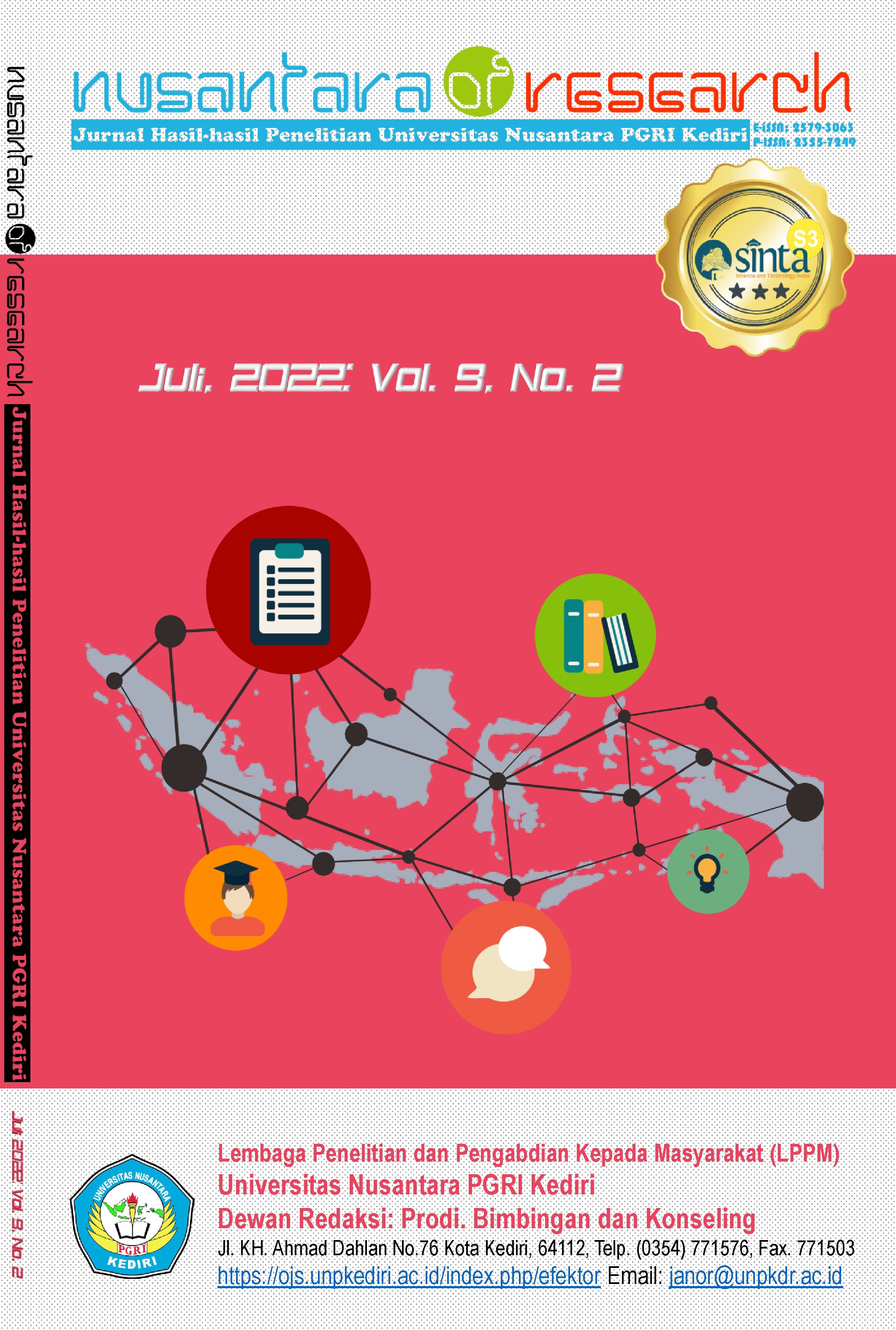Indoor And Outdoor Hybrid Learning Model To Improve Social Interaction Services For Person With Early Age Disabilities
Main Article Content
Abstract
This development research specifically aims to test the feasibility of indoor and outdoor hybrid learning model products in improving social interaction services for people with disabilities at an early age for kindergarten educators. This development research uses the Educational Research Development model design from Gall, Gall & Borg (2003). The application of the product feasibility test is carried out through expert and practical tests. Collecting data obtained from expert testing and practicality were analyzed using the percentage technique. Furthermore, the results of the accuracy of the indoor and outdoor hybrid learning model are packaged in a web network so that it can be used at any time and is flexible through learning innovations from each region, specifically to provide social interaction services for people with early age disabilities. Based on the feasibility level test of the model from the assessment of 2 PAUD and PLB experts, it was stated that the indoor and outdoor hybrid learning model product to improve social interaction services for people with early age disabilities for inclusive kindergarten educators could be used for testing, after being revised.
Downloads
Article Details
Issue
Section
Authors who publish with this journal agree to the following terms:
- Copyright on any article is retained by the author(s).
- The author grants the journal, the right of first publication with the work simultaneously licensed under a Creative Commons Attribution License that allows others to share the work with an acknowledgment of the work’s authorship and initial publication in this journal.
- Authors are able to enter into separate, additional contractual arrangements for the non-exclusive distribution of the journal’s published version of the work (e.g., post it to an institutional repository or publish it in a book), with an acknowledgment of its initial publication in this journal.
- Authors are permitted and encouraged to post their work online (e.g., in institutional repositories or on their website) prior to and during the submission process, as it can lead to productive exchanges, as well as earlier and greater citation of published work.
- The article and any associated published material is distributed under the Creative Commons Attribution-ShareAlike 4.0 International License
How to Cite
References
Aishworiya, R., & Kang, Y. Q. (2021). Including children with developmental disabilities in the equation during this COVID-19 pandemic. Journal of autism and developmental disorders, 51(6), 2155-2158.
Arsyad, A. (2004). Media pembelajaran. Jakarta: PT Grafindo Persada.
Barton, E. E., Choi, G., & Mauldin, E. G. (2019). Teaching sequences of pretend play to children with disabilities. Journal of Early Intervention, 41(1), 13-29.
Canney, C., & Byrne, A. (2006). Evaluating Circle Time as a support to social skills development–reflections on a journey in school‐based research. British Journal of Special Education, 33(1), 19-24.
Chadwell, M. R., Roberts, A. M., & Daro, A. M. (2020). Ready to teach all children? Unpacking early childhood educators’ feelings of preparedness for working with children with disabilities. Early Education and Development, 31(1), 100-112.
Gall, Gall and Borg, W.R. 2003. Educational Research: An Introduction. London: Longman, Inc.
Hallahan, D.P. and Kauffman, J. M. 1991. Exceptional Children Introduction to Special Education. New Jerssey: Prentice Hall Inc.
Hannafin, M.J. & Peck, K.L. 1988. The design, development, and evaluation of instructional software. New York: Mc Millan Publishing Company.
Irvan, M. (2020). Urgensi Identifikasi dan Asesmen Anak Berkebutuhan Khusus Usia Dini. Jurnal Ortopedagogia, 6(2), 108-112.
Kementerian Pendidikan Dan Kebudayaan, Undang-undang Nomor 20 Tahun 2003 tentang Sistem Pendidikan Nasional.
McCollow, M. M., & Hoffman, H. H. (2019). Supporting social development in young children with disabilities: Building a practitioner’s toolkit. Early Childhood Education Journal, 47(3), 309-320.
Monks, F. J, AMP Knors., & Siti Rahayu Hadinoto. 1998. Psikologi Perkembangan. Gajah Mada Unersity Press, Yogyakarta.
Purdue, K. (2009). Barriers to and facilitators of inclusion for children with disabilities in early childhood education. Contemporary Issues in Early Childhood, 10(2), 133-143.
Roesminingsih, M. V., & Susarno, L. H. (2011). Teori dan praktek pendidikan. Surabaya: Lembaga Pengkajian Dan Pengembangan Ilmu Pendidikan FIP Unesa.
Suryaningrum, C., Ingarianti, T. M., & Anwar, Z. A. (2016). Pengembangan model deteksi dini anak berkebutuhan khusus (ABK) pada tingkat pendidikan anak usia dini (PAUD) di kota Malang. Jurnal Ilmiah Psikologi Terapan, 4(1), 62-74.
Undang-Undang Republik Indonesia Nomor 8 Tahun 2016 Tentang Penyandang Disabilitas.




